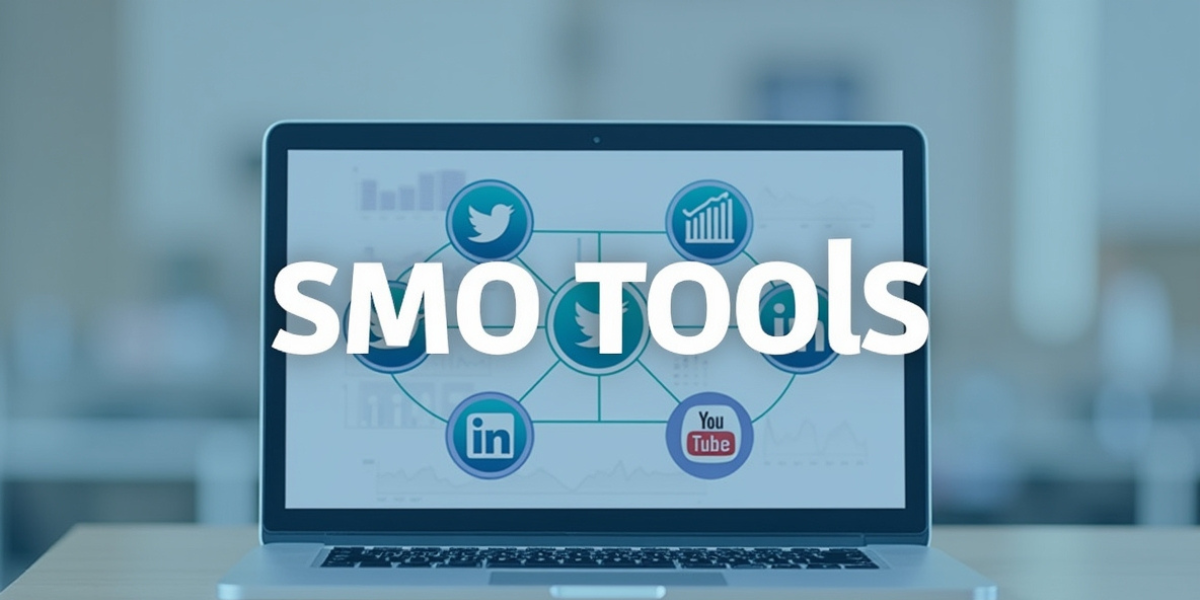The internet is a vibrant market where billions of people talk, connect, and learn. In this lively market, Social Media Optimization (SMO) is not just a trend; it’s an unreplaceable aspect of a successful digital strategy. With over 5 billion social network users worldwide, that’s more than 62% of the total world population, the brand engagement opportunity is enormous. Statistics reveal that over 70% of customers decide to make a purchase on the basis of social media recommendations, testifying to its power.
With so many users at its disposal, having a robust social presence is no longer a choice, but a necessity for businesses interested in being successful in 2025. That is where all SMO tools have their significance. They schedule, optimize, and track your social media campaigns, reducing a complex multi-platform process into a manageable and extremely efficient one.
Moreover, they are no longer about posting scheduling alone; they provide end-to-end solutions, from content creation to advanced analytics, so that your brand message reaches the intended audience at the right moment. In this article, we are going to talk about the top 16 all SMO tools which can revolutionize your social media strategy. So, let’s begin!
What Are All SMO Tools?
SMO tools refer to specialized software and platforms designed to assist businesses in planning, optimizing, and monitoring social media campaigns. They serve as one point of interface where marketers can perform all their social media operations from a single dashboard to maximize efficiency and reach. They essentially enable four key functions:
- Simple Management: They simplify the management of the formidable task of having multiple social media accounts from various platforms within a single interface.
- Scheduling Made Easy: These tools allow you to plan in advance and publish at regular time intervals, thereby ensuring a constant and timely stream of content, which is crucial in the continuation of audience rhythm and impression.
- Performance Analytics: They provide you with in-depth insights into post-performance, engagement statistics, and audience demographics, so you can make your strategies more effective based on concrete facts.
- Content Creation & Curation: These tools have all the facilities of graphic generation, trending topic tracking, and curation of appropriate articles, all of which keep your content up-to-date and engaging.
Also, the tools often facilitate efficient teamwork among team members, such that there is a well-coordinated and integrated social media plan, particularly beneficial for larger marketing teams.
Importance of Social Media Optimization in 2025
SMO remains a cornerstone of effective online marketing as of 2025, the key linkage between brands and consumers in the increasingly competitive online world today. The benefits of having a strong SMO strategy include:
- Increased Brand Visibility: SMO significantly enhances your brand visibility across many social networks, thus it is more probable for potential buyers to be familiar and remember you.
- More Audience Engagement: By encouraging improved content and engagement strategies, SMO attracts more active interaction with your audience in the form of likes, comments, shares, and direct messages.
- More Web Traffic: An effective SMO strategy converts social media referral traffic into real web visitors, boosts SEO, and increases the likelihood of conversion.
- Better Lead Generation: By using focused campaigns and optimized profiles, SMO effectively finds, nurtures, and builds leads into quality prospects.
- Competitive Edge: Through solid SMO strategies, a business can stand out from the competition, communicate its value proposition, and engage with customers in a manner different from other companies.
You Might Like: WhatsApp Group Names
Top 16 SMO Tools for Social Media Optimization
1. Hootsuite
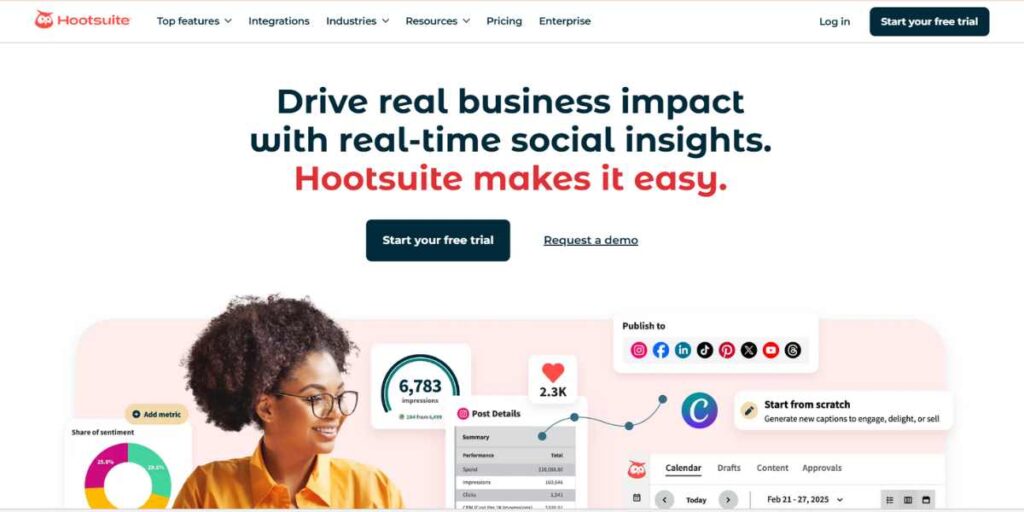
Hootsuite is a vintage and integrated social media management tool that allows users to manage multiple social media accounts from one interface. It provides strong scheduling, monitoring, and analysis of social media performance. What is strong about Hootsuite is that it can handle a large number of social networks, which is a favorite among enterprises with a multi-platform approach. Moreover, its powerful social listening tools enable you to track brand mentions and keywords, giving you insight into the public perception of your brand. Yet, while its free plan is extremely simplistic, the paid ones come with a solid feature set for large teams and agencies, making it one of the most reliable options among All SMO Tools available today.
- Key Features: Scheduling, social tracking, content discovery, team administration, and deep analytics.
- Best For: Full social media administration as well as multi-platform integration.
- Pricing: Paid plans start at $99/month (annual payment).
- Pros: Extremely feature-laden, supports many platforms, and has powerful analytics.
- Cons: Prices can be too much to bear, the UI can be overwhelming, and the freemium plan is very restrictive.
- Link: https://www.hootsuite.com/
2. Sprout Social
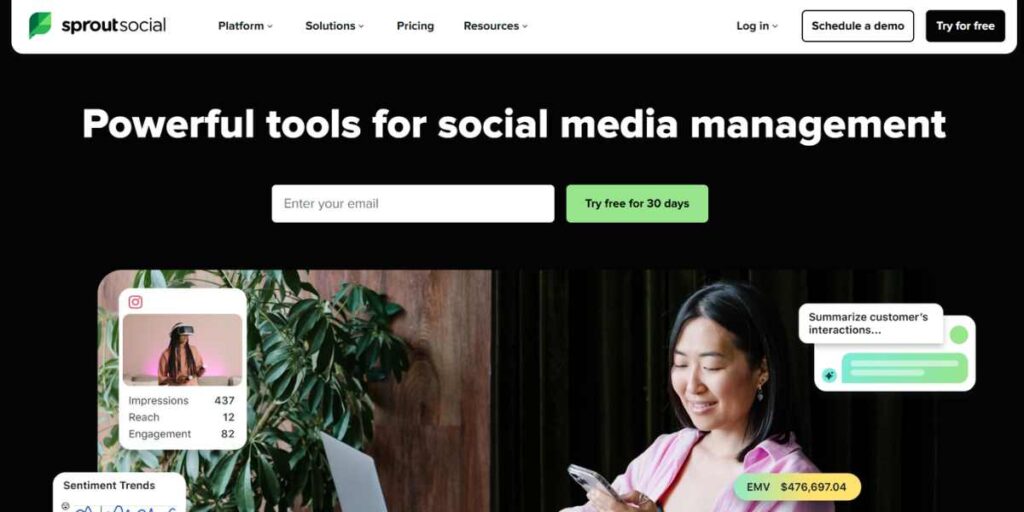
Sprout Social is a premium all SMO tool that is highly commended for its in-depth analytics, powerful social listening capabilities, and seamless integration with helpdesk and AI CRM tools. It benefits businesses and agencies that need to dig deep into customer service interactions, audience sentiment, and brand performance. Its Smart Inbox also consolidates all social messages in one location, enabling fast and efficient engagement with customer inquiries. Moreover, its top-notch reporting features provide highly customizable and complete data, something needed for sophisticated marketing plans as well as for proving ROI.
- Key Features: Smart Inbox, deeper analytics and reporting, social listening, team collaboration, CRM integration.
- Best For: Businesses and agencies seeking deep analytics and customer service integration.
- Pricing: Starts at $199/user/month.
- Pros: Excellent analytics, good social listening, great for team collaboration.
- Cons: Costly, may be too much for small businesses.
- Link: https://sproutsocial.com/
3. Buffer
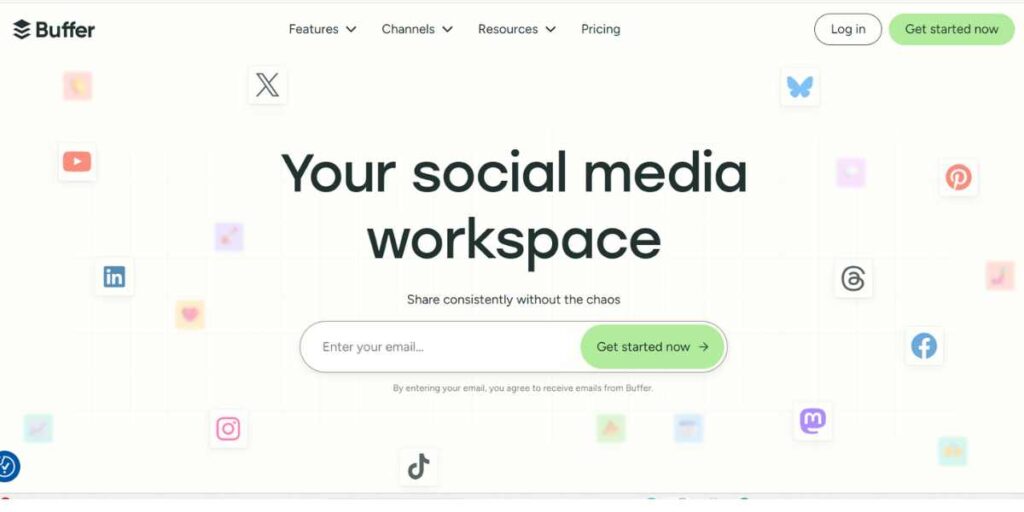
Buffer is a simple and basic social media management tool which aims at the easy scheduling of posts and analytics generation. A user can figure out all the functions of the software just by simply looking at the minimalistic design which is especially helpful for first-time social media managers. It is particularly suited for small businesses and content creators who must schedule consistently without the hefty learning curve. Also, the tool is easy-to-use, combined with a focus on continuous posting, making it a great option in maintaining an ongoing online presence and a must-have choice when exploring All SMO Tools for beginners.
- Key Features: Automated posting schedules, content queues, simple analytics, and a browser extension.
- Best For: Easy posting and a streamlined, beautiful interface.
- Pricing: $5 per month for each social network on paid plans.
- Pros: Straightforward to use, clean design, inexpensive.
- Cons: Less feature-rich than others, social listening is not where it excels.
- Link: https://buffer.com/
4. SocialPilot
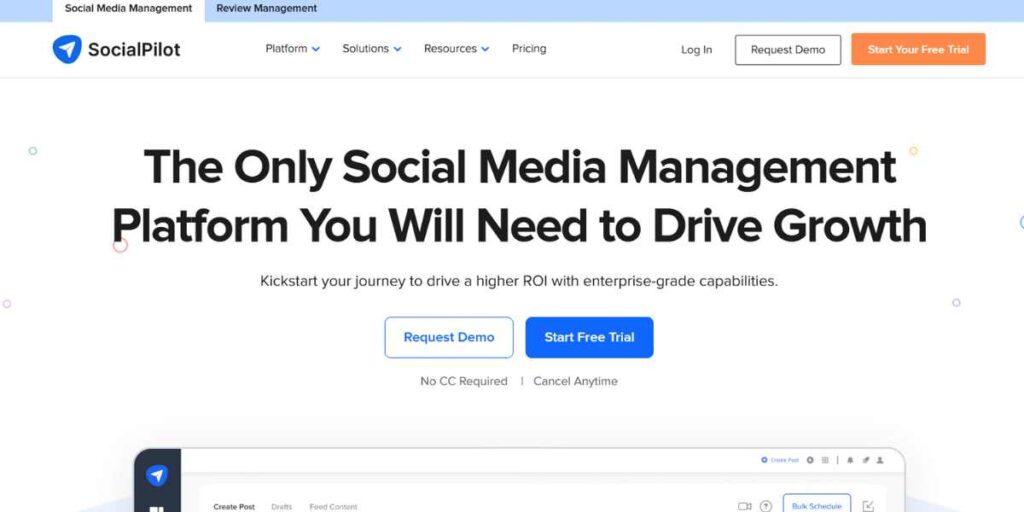
SocialPilot is an excellent value-for-money SMO tools, especially for multi-client agencies. It offers a complete set of scheduling, analytics, and teamwork functions, together with client management and white-label report functionality. Moreover, its bulk scheduling feature is a significant time-saver, allowing agencies to deal with content for numerous clients efficiently. Also, SocialPilot’s mix of premium functions and cost makes it a compelling choice for small to medium enterprises and agencies.
- Key Features: Bulk scheduling, social media analytics, social inbox, client management, content curation, and white-label reports.
- Best For: Small to medium-sized businesses and agencies with a limited budget.
- Pricing: Paid plans start at around $20/month.
- Pros: Extremely affordable, lots of features, great for bulk scheduling.
- Cons: User interface is not quite as intuitive as some others, and lacks some of the more advanced features of the top-tier programs.
- Link: https://www.socialpilot.co/
5. Vendasta

Vendasta is an all-in-one white-label social media management software built for marketing agencies, franchises, and businesses that help SMBs succeed. It allows partners to manage, schedule, and publish content across multiple social platforms from a single dashboard while offering full client transparency under their own brand.
Beyond social media scheduling, Vendasta integrates AI-powered tools for caption generation, post optimization, and analytics, helping teams maintain a consistent and engaging online presence. Its white-label model empowers agencies to resell the platform as their own, complete with automated reporting and client collaboration tools. Combined with Vendasta’s ecosystem of marketing, reputation, and lead management solutions, it’s a comprehensive tool for agencies looking to scale their digital offerings efficiently.
- Key Features: AI-generated content, multi-platform scheduling, performance analytics, white-label branding, and client collaboration.
- Best For: Agencies and franchises managing multiple SMB clients’ social media under one brand.
- Pricing: The Starter plan begins at $79 USD/month (billed annually), which includes access to core social marketing features.
- Pros: Seamless white-labeling, integrated AI tools, and unified dashboard for multi-client management.
- Cons: Requires onboarding to access full white-label features.
- Link: https://www.vendasta.com/social-media/social-marketing/
6. Canva
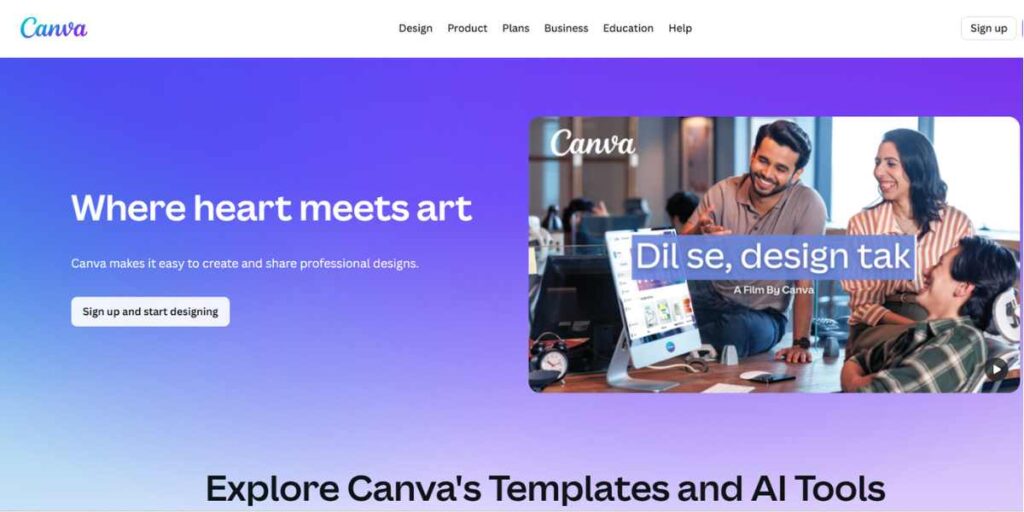
While not a traditional all SMO planning tool, Canva is an indispensable platform for creating visual content, and that is one of the most critical components of effective SMO. Moreover, its easy-to-use, drag-and-drop interface, extensive template library, stock photos, and graphical content enable anyone to produce professionally quality social media images without any design experience. In addition, it allows marketers to build high-quality, attention-drawing visuals that slice through crowded social streams. Canva’s simplicity and flexibility render it a must-have tool for any social media manager looking to elevate the visual story of their brand, making it a valuable addition when considering All SMO Tools for complete social media strategies.
- Key Features: Drag-and-drop editor, free access to thousands of templates, stock photos, and elements, and a brand kit (paid).
- Best For: Creating beautiful social media graphics and videos.
- Pricing: Canva Pro is $12.99/month.
- Pros: Easy to use, extensive library of templates, perfect for teams.
- Cons: Not a scheduling platform, requires a separate platform for publishing.
- Link: https://www.canva.com/
7. Later
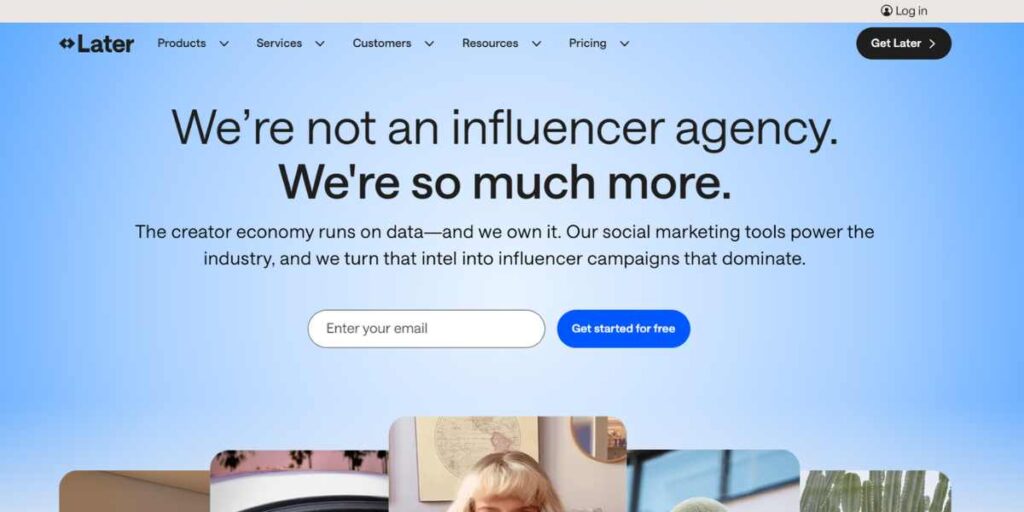
Later is a visual-led content calendar and scheduling tool that performs exceptionally well for Instagram and Pinterest. Its visual planning feature allows users to see exactly what their content grid is going to look like when live, which is crucial in maintaining a consistent appearance. Later also has strong analytics for visual platforms and Linkin.bio feature to drive traffic from Instagram. It’s a key tool for e-commerce businesses, influencers, and content creators who highly rely on these platforms for traffic and sales.
- Key Features: Visual content calendar, Instagram Grid Planner, Linkin.bio feature, and hashtag suggestions.
- Best For: Scheduling visual content on Instagram and Pinterest.
- Pricing: Paid account begins at $15/month.
- Pros: Excellent visual planning tools, perfect for Pinterest and Instagram, and simple to operate.
- Cons: Lack of strong support for other networks, less affluent in-depth analysis.
- Link: https://later.com/
8. Agorapulse
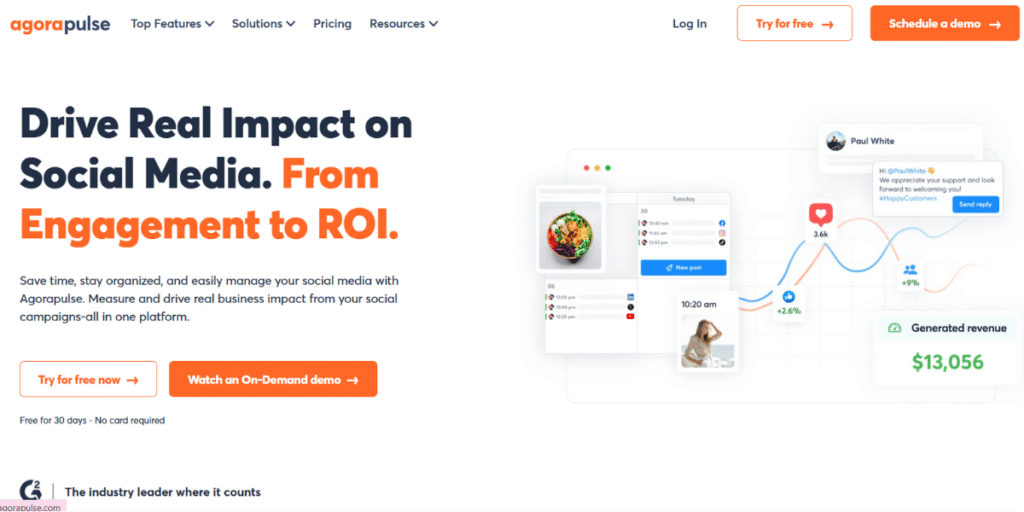
Agorapulse is a full-featured social media management software that provides a single platform for publishing, interacting, and monitoring social conversations. Moreover, it has one unified, single inbox to manage all the comments and messages on various social networks, which makes communication with your followers straightforward. On top of that, its social listening feature allows users to keep tabs on competitor activity and brand mentions. The easy-to-use interface and rich features of Agorapulse make it an excellent choice for agencies and businesses that need an effective online presence management.
- Key Features: Social inbox integration, scheduling and publishing, social listening, team collaboration, and detailed analysis.
- Best For: Detailed social media management with a focus on engagement.
- Pricing: Paid plans starting at $79/month.
- Pros: Real-time monitoring is a game-saver, great for team collaboration, and solid analytics.
- Cons: It can be too pricey for small teams.
- Link: https://www.agorapulse.com/
9. Mention
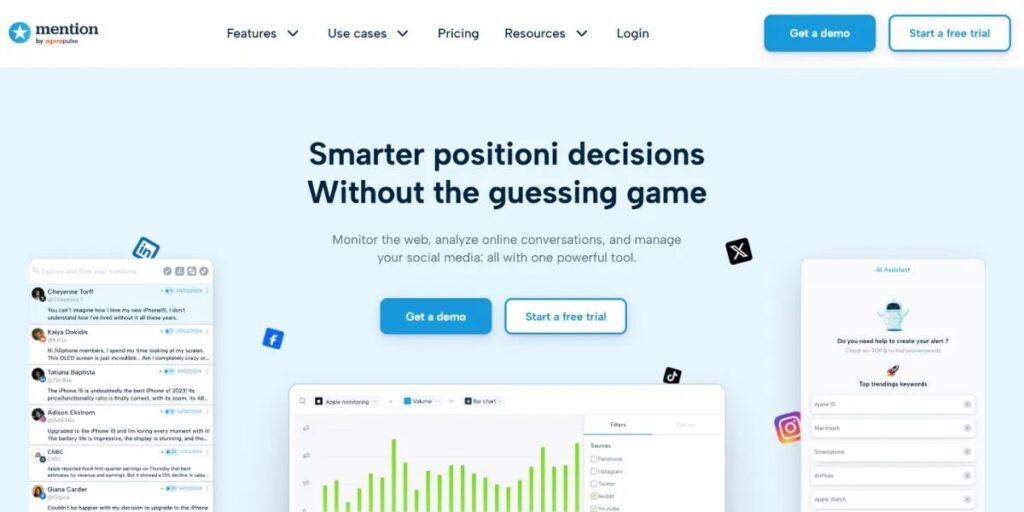
Mention is an online media monitoring system that simplifies brand mention and keyword tracking online and on social media. It provides immediate alerts whenever your brand is being mentioned, and it is possible to react quickly and defend your reputation. While not a traditional scheduling tool, its ability to monitor what is being said about your company is an invaluable component of a successful SMO campaign. Moreover, it allows you to maintain the conversation in check and actively reply to it.
- Key Features: Sentiment monitoring, competitor monitoring, influencer discovery, and real-time notifications.
- Best For: Real-time brand and media monitoring.
- Pricing: Paid plans starting at $49/month.
- Pros: Good real-time monitoring, perfect for reputation monitoring.
- Cons: Not a scheduler, may require another tool for publishing.
- Link: https://mention.com/
10. BuzzSumo
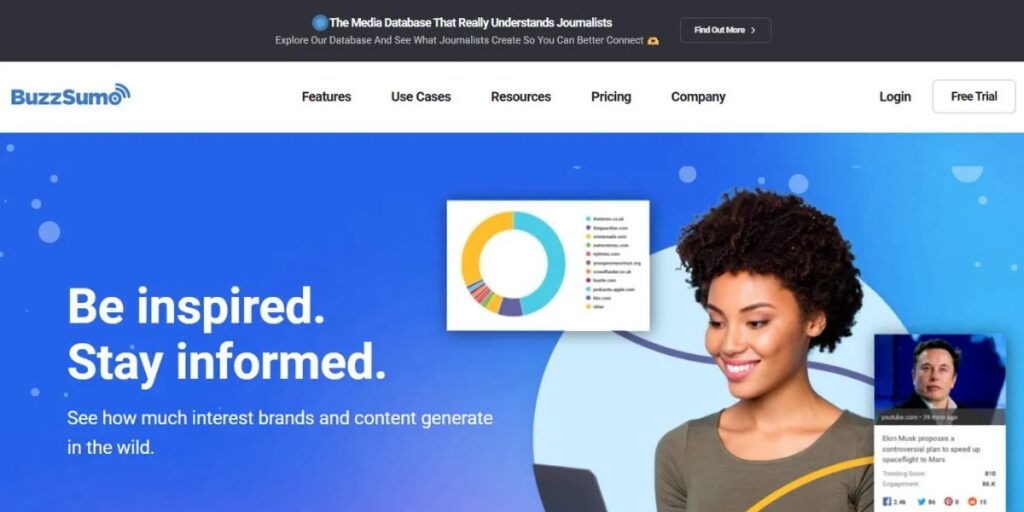
BuzzSumo is social listening and content research software that marketers leverage to discover popular topics, top content, and key players in their niche. Via its powerful search feature, you can uncover content that has worked well on social media so you can replicate the formula with your own content strategy. Moreover, it’s a fantastic content creation and curation tool that keeps you in the knowledge and comes up with great content that resonates with your target audience.
- Key Features: Discovery of content, influencer search, social listening, and competitor analysis.
- Best For: Content research and idea generation.
- Pricing: Basic plan is free; paid plans begin at $99/month.
- Pros: Excellent for finding trending content, excellent for influencer marketing.
- Cons: Costly, not a publishing or scheduling tool.
- Link: https://buzzsumo.com/
11. Zoho Social
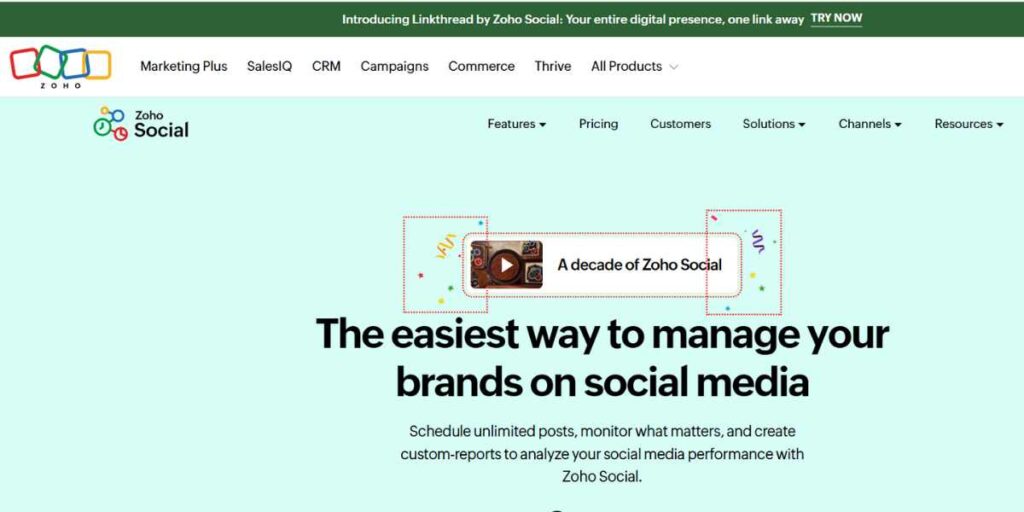
Zoho Social forms part of the bigger Zoho family of business apps, thus making it an ideal solution for firms that are already leveraging Zoho CRM or any other Zoho tool. It basically allows managing the social media profiles in a simple and efficient way by scheduling, tracking, and reporting activities, besides the CRM’s simple and logical integration that makes it possible to share information between the two applications. Such connection allows for one integrated view of customer interactions, thereby social engagement being linked to sales and service work. It’s a viable option for companies seeking a low-cost solution that fits their existing business infrastructure.
- Key Features: Publishing calendar, social monitoring, basic analytics, CRM integration, and team collaboration.
- Best For: Small businesses and existing Zoho customers.
- Pricing: Paid plans start at around $8/month (billed annually).
- Pros: Ideal for Zoho users, value for money, perfect for collaboration.
- Cons: Lacks some of the more advanced features of premium products, and has a minimal free plan.
- Link: https://www.zoho.com/social/
12. Sendible
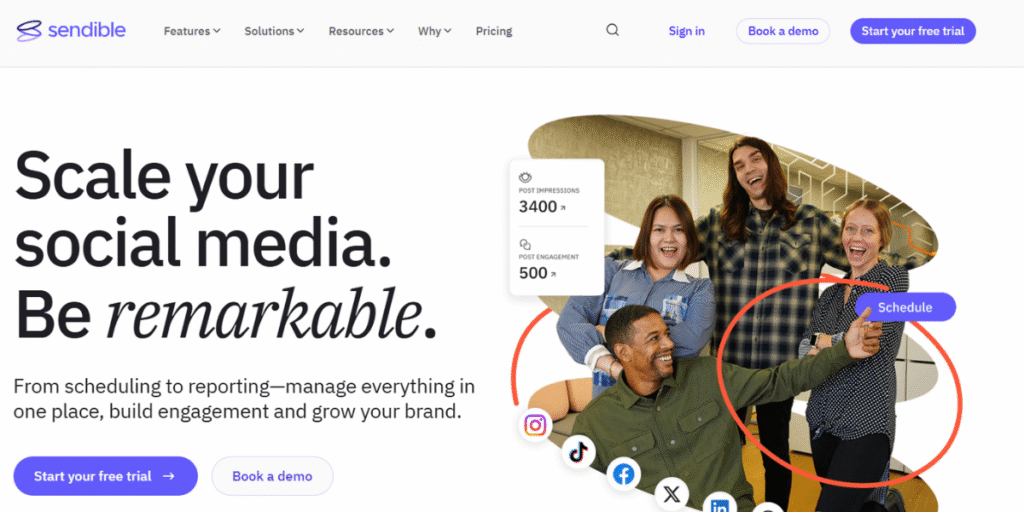
Sendible is an SMO all tool with immense power and tailored specifically for agencies and businesses managing multiple client accounts. It’s a robust, all-in-one schedule, report, and client collaboration platform. Moreover, the power of Sendible lies in the fact that it can offer white-label solutions, making it easy for agencies to deliver professional, agency-branded reports to clients. It also has a robust AI content assist feature and unlimited scheduling on its paid plans. Additionally, its ability to integrate with Canva and Google Drive makes content creation and sharing easier.
- Key Features: Automated scheduling, client dashboards, white-label reports, team collaboration, and AI content assist.
- Best For: Marketing consultant firms and agencies dealing with multiple clients.
- Pricing: Paid plans begin at $29/month.
- Pros: Excellent for agencies, wonderful reporting features, and great collaboration features for teams.
- Cons: High-end prices could be a deterring factor for small businesses; some of the features are only available on higher plan levels.
- Link: https://www.sendible.com/
13. Iconosquare
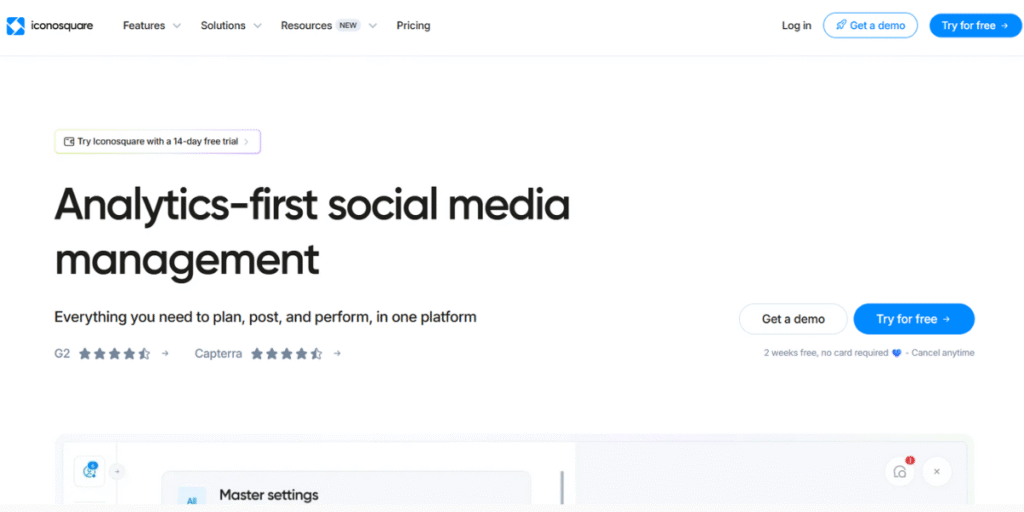
Iconosquare is an all SMO niche tool that is extremely powerful on analytics and management for Facebook and Instagram. It goes beyond the simple metrics to deliver in-depth insights into follower development, average engagement rate, and competitive benchmarking. With this focus on visual-first platforms, it is a go-to tool for brands and agencies that rely on Instagram and Facebook advertising. Moreover, it also has strong scheduling features, including the ability to auto-post Reels and collaborate on content with teams.
- Key Features: Instagram & Facebook analytics, competitor analysis, post scheduling, and customizable dashboards.
- Best For: Companies and brands that are interested in Facebook and Instagram analytics.
- Pricing: Paid plans start at $49/month.
- Pros: In-depth, visually-based analytics, excellent competitor analysis.
- Cons: Fewer platforms supported than other platforms, no free version (offers a 14-day trial).
- Link: https://www.iconosquare.com/
14. Sprinklr
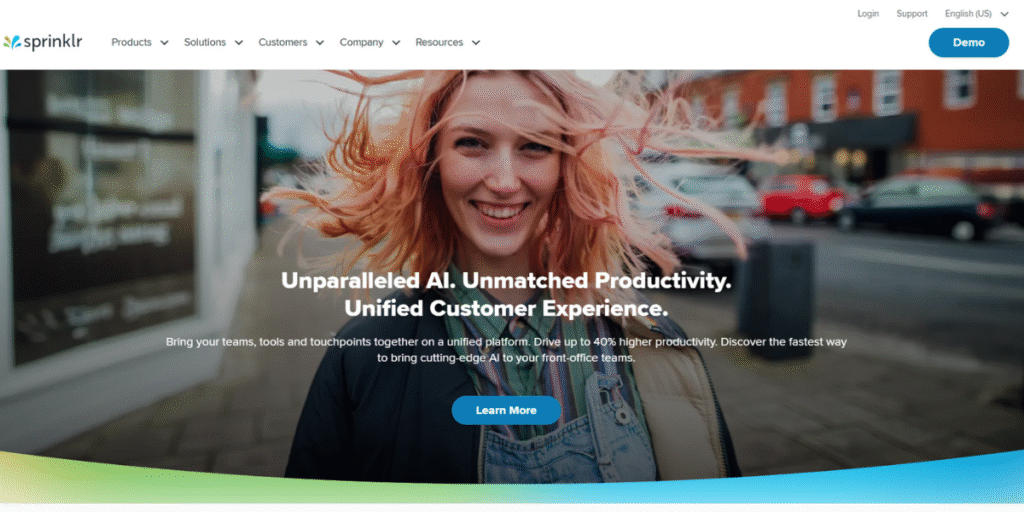
Sprinklr is an enterprise-level platform that offers a complete set of solutions, including social media management, advertising, and customer care. It’s designed for the largest companies in the world, which need an all-encompassing platform to manage customer experiences across more than 30 digital channels. The power of Sprinklr resides in its enterprise-level AI, which helps with everything from content generation to understanding the audience and customer care automation. Also, its robust governance feature ensures brand uniformity across every corner of the world and teams.
- Key Features: Social media management, social ads, customer care solutions, and sophisticated AI.
- Best For: Big enterprises and multinational corporations.
- Pricing: Business-tailored pricing (oftentimes very high).
- Pros: Industry-leading scale and functionality, robust AI and governance tools.
- Cons: Very pricey, overkill for small and medium-sized companies.
- Link: https://www.sprinklr.com/
15. Quuu
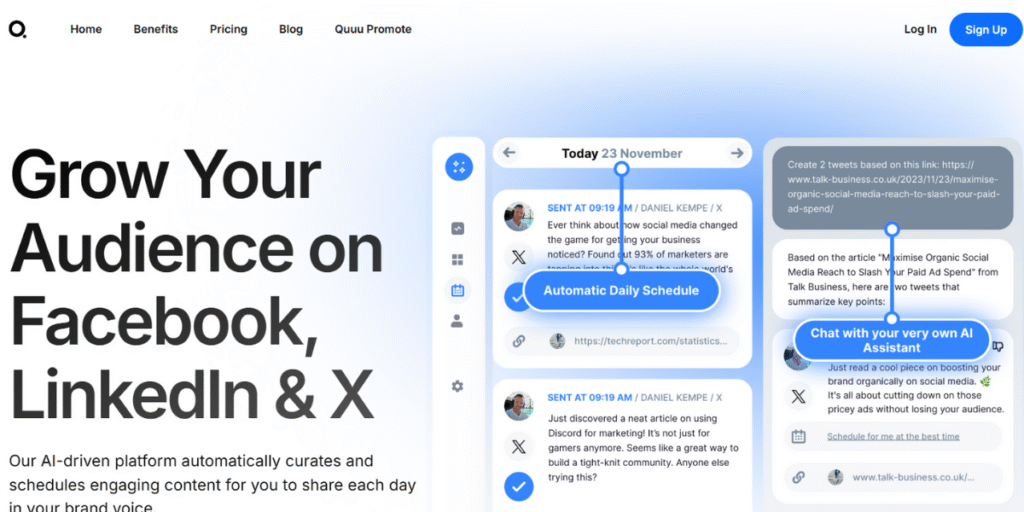
Quuu is a content curation platform that automates the process of finding and sharing relevant content for your social media accounts. Instead of spending hours searching for articles to share, Quuu provides a daily feed of high-quality, hand-curated content based on your selected interests. This enables marketers to have a steady flow of new content and interact with their audience without the legwork of finding the content. Apart from this, its auto-queue keeps your social streams filled with a mix of posts all the time.
- Key Features: Content curation, automated posting, industry-specific content recommendations, and AI-driven curation.
- Best Foe: Content creators and businesses looking for content curation automation.
- Pricing: Paid plans begin at $19.79/month.
- Pros: Time-saving, provides excellent content, and is very user-friendly.
- Cons: It is not a complete management tool (no sophisticated analytics or social listening), and has to be paired with another scheduling tool.
- Link: https://quuu.co/
16. Repurpose.io
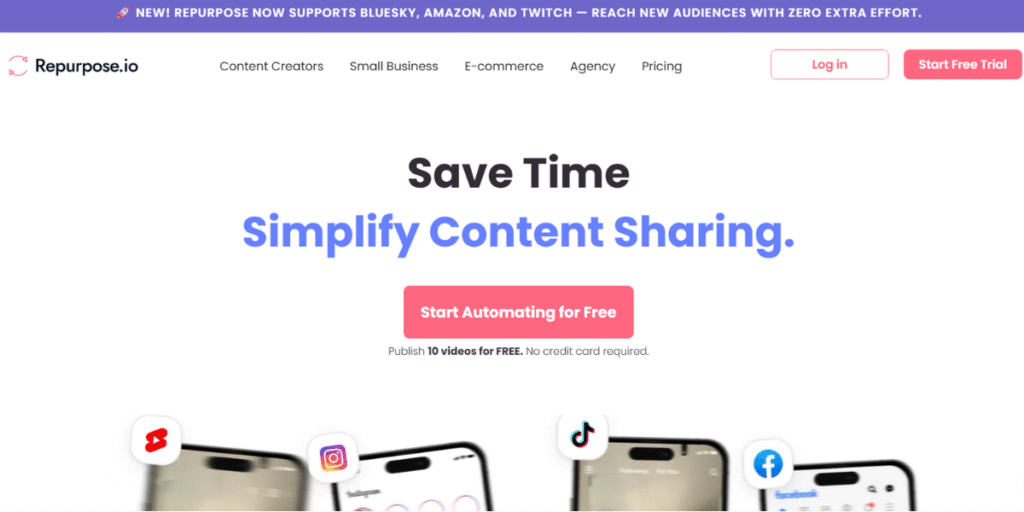
Repurpose.io is one of the most innovative all SMO tools that automatically repurposes content on various social media platforms. It’s meant for long-form content creators such as podcasts or YouTube videos, and would like to easily transform them into shorter, channel-specific types such as TikTok clips, Instagram Reels, and YouTube Shorts. It saves so much time and effort and allows an organization to have a good presence on different channels without manually creating new content for each of them.
- Key Features: Automated repurposing of content, video resizing, watermark removal, and scheduling.
- Best For: Content marketers and creators who want to gain the most reach through repurposing of content.
- Pricing: Paid plans start at $2.63/day ($79/month, billed monthly).
- Pros: Automates a labor-intensive process, supports a wide variety of platforms, and is very effective for creators.
- Cons: Niche-specific (not a general-purpose social media management tool), too specialized for some users.
- Link: https://repurpose.io/
Factors to Consider When Selecting an SMO Tool
While selecting the ideal set of SMO tools that meet your needs, it is necessary to identify an all-encompassing set of features that will guide your social media campaigns. Key things to consider are:
- Multi-Platform Support: To be able to handle and communicate with a large number of social media sites (Facebook, Instagram, X, LinkedIn, Pinterest, TikTok, etc.) using a single interface will prevent time-consuming switching between sites.
- Advanced Scheduling & Publishing: Make sure it supports features like bulk scheduling, content queue, and customization of posts per platform. It should be able to post timely as well as format posts in the proper form.
- Strong Reporting & Analytics: In-depth reporting with affluent data on the demographics of the audience, engagement, reach, and conversions is required to understand campaign effectiveness and guide subsequent campaigns.
- Social Monitoring & Listening: Tools that allow you to track mentions of your brand, related keywords, and mentions of competitors enable real-time interaction and effective reputation management.
- User Experience and Learning Curve: Select a tool with an easy-to-use interface that your team will easily learn to use without extensive training. An easy-to-use tool assists with productivity tools and frequent use.
Comparing Free vs. Paid SMO Tools
| Feature | Free SMO Tools | Paid SMO Tools |
| User & Profile Limits | Highly restricted (e.g., 1 user, 1-3 social profiles) | Generous limits (multiple users, 10+ profiles), scalable with plans |
| Scheduling | Very basic, limited number of posts per month | Advanced features like bulk scheduling, content queues, and evergreen content |
| Analytics & Reporting | Basic metrics (likes, comments), short data history | In-depth analytics, custom reports, competitor analysis, long data history |
| Social Listening | Often not included or very limited | Robust features for monitoring mentions, keywords, and sentiment analysis |
| Team Collaboration | Usually a single user | Advanced features like approval workflows, team roles, and shared inboxes |
| Integrations | Limited, if any | Integrations with other marketing tools, CRMs, and ad platforms |
| Support | Community forums or limited email support | Dedicated customer support, live chat, and onboarding assistance |
| Ad Management | Not available | Features to manage, analyze, and optimize ad campaigns |
Best Practices for Using SMO Tools Effectively
To get the maximum return on investment on all SMO tools, it is essential that you make a strategic move. The following practices will help you optimize your return.
- Audit Your Social Channels: Start by analyzing your social media profiles’ performance now to decide where you can do better before you add new tools.
- Create a Content Calendar: Utilize your tool’s scheduling capabilities to schedule your content far in advance so that a steady and varied stream of posts appears according to your strategy.
- Take Advantage of Analytics: Monitor your tool’s performance statistics constantly to know what works for your audience and change your strategy based on this.
- Engage Regularly: Take advantage of the social listening and unified inbox features to respond to comments and mentions in a timely fashion, building a positive and loyal fan base for your brand.
- A/B Test Your Content: Use the scheduling and analytics features to test different types of content, posting times, and images to optimize for the most engagement.
Advanced Features of SMO Tools
As the digital world advances, so do the capabilities of every SMO application. The platforms of today do much more than mere scheduling, offering advanced tools that provide a significant competitive edge.
- Social Listening & Sentiment Analysis: These enable you to monitor brand mentions and keywords in real-time and analyze public sentiment (positive, negative, neutral) on your brand.
- AI-Powered Content Creation: Some tools start applying AI to generate content ideas, write captions, and even create visuals, saving time and sparking creativity.
- Integrated Social Inbox: It brings all messages, comments, and mentions from social networks into one inbox, so no engagement goes unnoticed.
- Integration with CRM: Having the ability to tie social media engagement with your customer relationship management (CRM) system provides an end-to-end picture of each customer journey.
- Competitor Analysis: All the tools allow you to track your competitors’ social performance, learn about their strategies, and discover new opportunities for you.
Common Challenges with SMO Tools and How to Overcome Them
Even though all SMO tools offer great benefits, they could also create some challenges if not addressed the right way. These challenges include:
- Tool Overload: Having too many tools under your belt can complicate your workflow and make it less efficient. Instead, opt for one, all-purpose platform that meets most of your needs.
- Steep Learning Curve: Some premium tools have a steep learning curve. Use their tutorials, webinars, and support to ensure your team is adequately trained and comfortable.
- Cost: High-end tools are expensive. Begin with a free trial or a basic plan to experiment with the ROI before moving to a costly, long-term strategy.
- Lack of Integration: A tool that is not integrated with your existing marketing stack can disrupt your workflow. Choose a tool that integrates seamlessly with the tools you already use.
- Data Overwhelm: Robust analytics can provide a lot of data. Focus on the key performance indicators (KPIs) that matter most to your business to avoid getting lost in a sea of numbers.
Conclusion
The digital marketing world is a moving target, but one thing remains clear: the clever use of Social Media Optimization (SMO) is still the deciding factor between success and failure. Coherent SMO tools facilitate each other all the way to the top by enabling companies to increase their social visibility, getting their voice heard, and establishing rapport with their potential customers, hence gaining a competitive advantage.
With solutions ranging from budget-friendly tools best appropriate for start-up brands to feature-rich premium platforms best suitable for large businesses, there is a wide range of solutions to fit every need and price point. By precisely analyzing your goals, collaboration with your team, and aspired functionality, you can choose the best all SMO tools and Plagiarism Checker Tools that will not only take your current campaigns to the next level but will also scale with your business.
FAQs
1. What is the fundamental difference between SMO and SEO?
SMO is optimizing your social media profile in order to stimulate brand visibility and engagement, whereas SEO is optimizing your website for search engines in order to establish organic traffic.
2. Can a small business succeed with free SMO tools?
Free all SMO tools offer key scheduling and analytics functions that a small business can use to establish a consistent social media presence without necessarily spending too much money.
3. How often should I check my SMO tool’s analytics?
You should be checking your analytics weekly at least to monitor content performance, identify trends, and adjust your strategy accordingly.
4. Would you rather have multiple niche tools or one all-encompassing platform?
A one-stop solution is generally better because it brings everything together, while individual specialty tools might be perfect for experts who need highly specialized, detailed capabilities.
5. What is social listening, and why is it so crucial to SMO?
Social listening is the process of monitoring online conversations pertaining to your business, your industry, or essential keywords, which is crucial both for reputation management and measuring audience sentiment.
